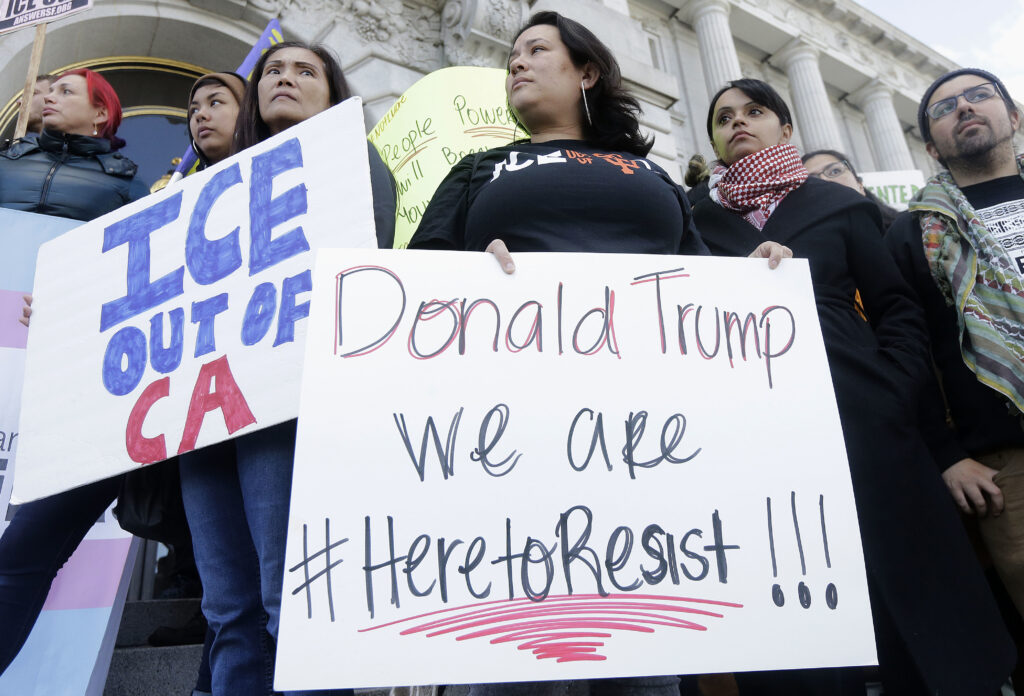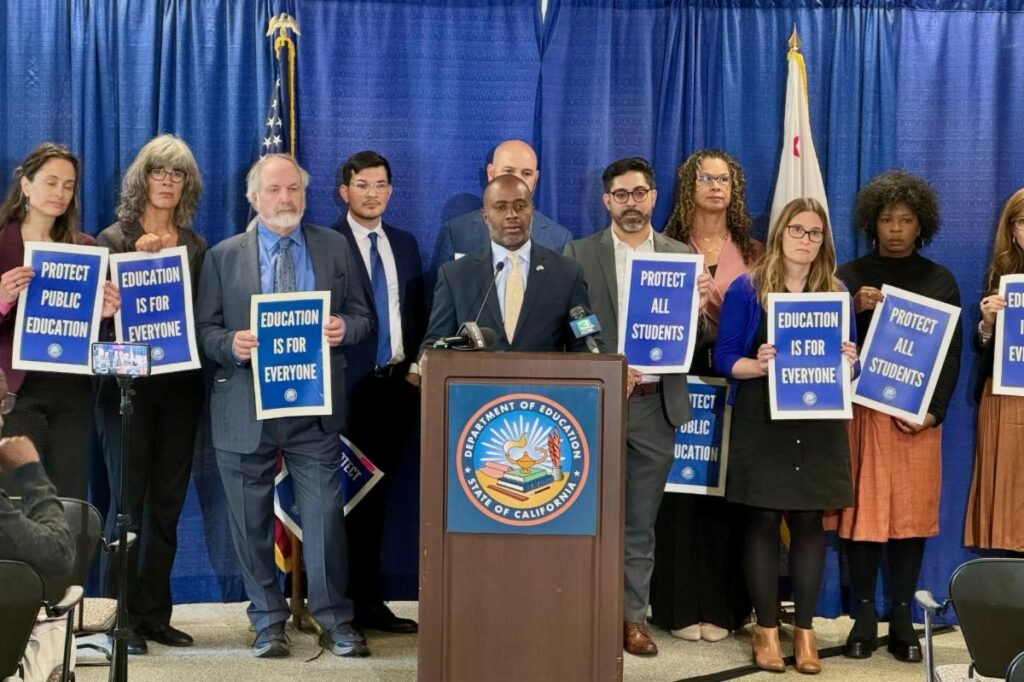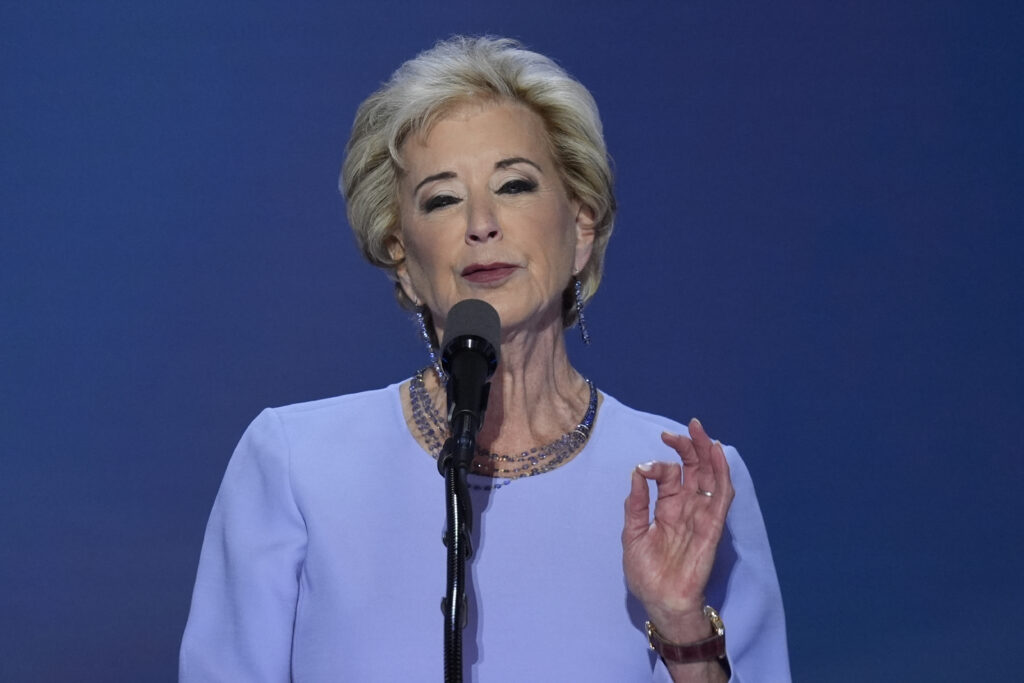Dana Milbank tries to find humor in Trump’s disastrous policies. Trump inherited a healthy economy. In only a few months, he has repeatedly crashed the stock market, wiping out trillions of dollars. He announced global tariffs on what he called “Liberation Day,” he lunges forward with his latest nutty idea (seizing control of Greenland), then lurches back for a brief period of sanity. No one seems able to modulate his behavior. The good news is that his poll numbers continue to fall.
Dana Milbank, a regular columnist for The Washington Post, reviewed some of the latest nuttiness, giving evidence that searing critiques of Trump do survive publication in The Post.
He writes:
I love it when MAGA bros speak Yiddish.
“The president deserves better than the current mishegoss at the Pentagon,” John Ullyot, who just quit as a top aide to Defense Secretary Pete Hegseth, wrote in a takedown of his former boss in Politico this week.
Ullyot, who had been the department’s chief spokesman, described “a month of total chaos at the Pentagon,” a “near collapse inside the Pentagon’s top ranks” and a “full-blown meltdown at the Pentagon,” and he alleged that “the Pentagon focus is no longer on warfighting, but on endless drama.”
Let me offer Ullyot a heartfelt mazel tov, both for his courage and for his use of the term “mishegoss” — which is on point, if not entirely precise. It means, literally, “insanity,” though as Leo Rosten noted in “The Joys of Yiddish,” mishegoss “is nearly always used in an amused, indulgent way” to connote tomfoolery. But there is nothing amusing about what these shmegegges are doing at the Pentagon. Their insanity is putting the lives of our troops and the security of our nation at risk.
We now know the woefully unqualified Hegseth, a former Fox News personality, shared details of a military operation in a second Signal chat; this one, the New York Times reported, included his wife, brother and lawyer. He also had the app put on his Defense Department computer. Hegseth has purged his top staff — people he just hired — and blames them for a series of damaging leaks. He set up a top secret briefing on China for Elon Musk, ignoring an outrageous conflict of interest that even the Trump White House couldn’t stomach. He brought his wife to sensitive meetings. He had a makeup studio set up for TV appearances, CBS News reported.
Under Hegseth, the whole place has devolved into paranoia and vulgar recriminations. Hegseth’s ousted chief of staff, two of his former colleagues told Politico, “graphically described his bowel movements to colleagues in one high-level meeting.”
Oy gevalt.
It’s not just at the Pentagon. Across the executive branch, in agency after agency, it’s amateur hour under the Trump administration.
That titanic legal battle with Harvard University now underway over academic freedom and billions of dollars in grants? The whole thing might have been set off by mistake. The Times reported that the university, after announcing its intention to fight the administration, received a “frantic call from a Trump official” saying the administration’s letter full of outrageous demands that provoked the standoff was “unauthorized” and should not have been sent.
Likewise, in the celebrated case of Kilmar Abrego García, deported from Maryland to El Salvador in violation of a court order, the Trump administration blamed “an administrative error” and “an oversight” for the original deportation.
Now, the administration is trying to justify Abrego García’s deportation retroactively with a statement from a disgraced police officer who claims the Maryland resident was an “active member” of the MS-13 gang in Upstate New York — where he has never lived.
And — oops — the administration did it again. On Wednesday, a Trump-appointed judge ruled that the administration had deported another person, a 20-year-old Venezuelan migrant, in violation of a court-approved settlement, and must facilitate his return.
There’s mishegoss at the IRS, which is now on its fifth commissioner in three months; the last one presided for only three days before being replaced last week, the victim of a power struggle between Musk and Treasury Secretary Scott Bessent that exploded into a shouting match in the West Wing.
Treasury Secretary Scott Bessent listens as President Donald Trump speaks during a meeting with Norwegian Prime Minister Jonas Gahr Store at the White House on Thursday. (Demetrius Freeman/The Washington Post)
There’s mishegoss at the Department of Homeland Security, where Secretary Kristi Noem had her Gucci bag containing $3,000 in cash stolen from under her seat at the Capital Burger restaurant in D.C. on Sunday. This follows her recent visit to El Salvador, where she posed in front of imprisoned deportees while wearing a $50,000 Rolex.
There’s mishegoss at the Department of Health and Human Services, where Secretary Robert F. Kennedy Jr. made the ridiculous claims this week that “teenagers in this country have the same testosterone levels as 68-year-old men” and that diseases such as Type 1 diabetes, rheumatoid arthritis and lupus, which have been described in medical literature for centuries, “were just unknown when I was a kid.”
There’s mishegoss in the White House briefing room, where press secretary Karoline Leavitt this week gave a seat of honor and the first question to far-right influencer Tim Pool, who has various white-nationalist ties and was funded (unknowingly, he says) by a Russian propaganda outlet.
There’s mishegoss at the National Security Council, where national security adviser Mike Waltz, while promoting the fiction that the president’s unilateral executive orders are acts of Congress, claimed this week that Trump “just passed an amazing executive order” — as though it were a kidney stone.
But the meshuggener in chief resides in the Oval Office. There, Trump announced this week that “the cost of eggs has come down like 93, 94 percent since we took office.” If that were true, eggs should now cost about 39 cents per dozen.
Cock-a-doodle-doo!
Trump edged closer this week to admitting that the centerpiece of his economic agenda — his trade war — was a mistake. Two weeks ago, Trump was still attacking China for its “lack of respect” and raising tariffs on Beijing to 145 percent. But as stock markets were finishing what would have been their worst April since the Great Depression, Trump did another about-face, as he had done earlier with his “reciprocal” tariffs. “We’re going to be very nice” to China, he said this week, and the tariffs “won’t be anywhere near” the current 145 percent. In China, which denied Trump’s claim that the two countries were in talks, analysts claimed victory, citing Trump’s “panicking.”
The markets also forced Trump to acknowledge error in his plans to oust Federal Reserve Chair Jerome Powell. Last week, Trump proclaimed that Powell’s “termination cannot come fast enough,” and Trump’s top economic adviser, Kevin Hassett, said that “the president and his team will continue to study” the legality of firing Powell. But Trump reversed himself this week, saying he had no plans to fire Powell: “None whatsoever. Never did.”
Why would anyone think otherwise?
Federal Reserve Chair Jerome H. Powell during a Senate Banking Committee hearing on Feb. 11. (Valerie Plesch/For The Washington Post)
The president can’t even seem to keep his endorsements straight. In December, he endorsed Karrin Taylor Robson’s candidacy for Arizona governor. But this week, he announced that he was also endorsing Robson’s opponent in the GOP primary, Rep. Andy Biggs. He offered “MY COMPLETE AND TOTAL ENDORSEMENT TO BOTH.”
We are by now accustomed to Trump’s amateurism. When he rolled out his “reciprocal” tariffs, they targeted penguin-occupied Antarctic outposts and the like. When his administration rolled out its memo requiring a government-wide spending freeze, the memo was quickly rescinded, as White House officials claimed it (like the Harvard letter) hadn’t been approved.
The whole meshuggene administration could use some oversight. So what is Congress doing? Well, Sen. Ron Johnson, Republican of Wisconsin and chair of the Permanent Subcommittee on Investigations, announced this week that he would hold a hearing on … his belief that the Sept. 11, 2001, attacks were an inside job. “Start with Building Seven,” he said during a podcast, referring to a common conspiracy theory. He said that the World Trade Center structure collapsed because of a “controlled demolition,” that the evidence was destroyed, and that the National Institute of Standards and Technology’s investigation was “corrupt.” Quoth QAnon Ron: “My guess is there’s an awful lot being covered up in terms of what the American government knows about 9/11.”
Trump this week voiced his determination that “we’re not going to be a laughingstock” among nations. It’s a bit late for that.
Let’s review where Trump’s mistakes have left us over the past week.
The International Monetary Fund reduced growth forecasts for the United States to just 1.8 percent this year, down from 2.8 percent last year, in large part because of Trump’s trade war. After saying it would reach 90 trade deals in 90 days, the administration has yet to negotiate even one. The CEOs of Walmart, Target and Home Depot warned the president that his tariffs would lead to empty shelves, as Axios first reported — part of what caused Trump’s latest surrender on China. Markets were pleased, but Americans have been deeply shaken. A Gallup poll found a record number of people saying their personal financial situation is deteriorating. A Reuters-Ipsos poll found that only 37 percent of Americans approve of Trump’s handling of the economy, lower than it ever was during his first term. Fox News found that Trump is lower in public esteem than any other president has been at the 100-day mark in more than a quarter-century.
Trump’s cruelty, by contrast, exceeds that of all others. Gothamist, a publication of New York Public Radio, carried a heartbreaking account this week of migrant children at shelters in New York facing an immigration judge alone because the Trump administration has cut off the funding that provides them with lawyers. The judge explained why the United States wants to deport a group that “included a 7-year-old boy, wearing a shirt emblazoned with a pizza cartoon, who spun a toy windmill.” The report went on: “There was an 8-year-old girl and her 4-year-old sister, in a tie-dye shirt, who squeezed a pink plushy toy and stuffed it into her sleeve. None of the children were accompanied by parents or attorneys, only shelter workers who helped them log on to the hearing.”
In foreign affairs, Trump is proposing the most odious appeasement in Europe since Neville Chamberlain abandoned the Sudetenland. He is demanding Ukraine surrender the 20 percent of its country, including Crimea, that Vladimir Putin has seized and abandon any hope of joining NATO. When Ukraine’s Volodymyr Zelensky understandably protested, Trump dismissed him as a man with “no cards to play.” Putin continues some of his most savage attacks of the war (Russian strikes on Kyiv early Thursday killed at least 12 people and wounded about 90 others) in expectation that Trump will force Ukraine to give up even more. “Vladimir, STOP!” Trump pleaded in a Truth Social post on Thursday morning. (Trump simultaneously resumed his attacks on our former friend and ally Canada, saying it “would cease to exist” as a country without U.S. support.)
Police officers help an injured woman leave her damaged house in Kyiv after a Russian airstrike on Thursday. (Evgeniy Maloletka/AP)
Trump’s corruption has become even more brazen. A website promoting Trump’s cryptocurrency “meme coin,” $TRUMP, announced that the top 220 investors in the meme coin — proceeds of which go directly to Trump and his family — would be invited to an “Intimate Private Dinner” with the president and a “Special VIP tour.” The Justice Department has stepped in to help Trump in his appeal of the $83 million jury award against him for defaming writer E. Jean Carroll, which would amount to a gift by the taxpayers to Trump of millions of dollars in legal fees. A Trump political appointee at the Treasury Department has asked the IRS to reconsider audits of two “high profile friends of the president,” including MyPillow’s Mike Lindell, The Post’s Jacob Bogage reported. And Musk’s SpaceX is poised to be given a juicy contract by the Pentagon to build Trump’s “Golden Dome” missile shield.
To arrest Trump’s ongoing abuses of power, judges have now weighed in more than 100 times blocking his actions, at least temporarily. Though Trump officials, including an increasingly hysterical Stephen Miller, blame a “rogue, radical-left judiciary” and “communist, left-wing judges” (as Miller screamed Wednesday night on Fox News’s “Hannity”), the judges include conservatives such as Royce Lamberth, a Reagan appointee, who this week ordered the administration to restore Voice of America. Lamberth said the administration’s attempt to shut down VOA was “a direct affront to the power of the legislative branch” and said it would be “hard to fathom a more straightforward display of arbitrary and capricious actions.”
Likewise, appellate Judge J. Harvie Wilkinson III, a conservative icon, last week said the administration’s deportations without due process were a threat to “the foundation of our constitutional order” and should be “shocking not only to judges but to the intuitive sense of liberty that Americans far removed from courthouses still hold dear.” Yet Trump continues to worsen the constitutional crisis by ignoring or slow-walking responses to court orders, not just in deportation cases but also in cases where courts have blocked the firings of federal workers, such as those employed by the Consumer Financial Protection Bureau.
This largely illegal destruction of federal functions continues to pile up casualties and proposed casualties: Food-safety inspections. Efforts to make infant formula safer. Milk testing. Weather balloons. Monitoring of IVF treatment safety. Data on maternal health. The administration has even tried to sell off the Montgomery, Alabama, bus station where Freedom Riders were attacked in 1961; it now houses the Freedom Rides Museum. Republican Rep. Austin Scott of Georgia proposed a plan that would sharply cut what the federal government spends on Medicaid. Happily, after a disastrous quarter for Tesla (net income fell 71 percent, largely because of its CEO’s antics), Musk said he would “significantly” reduce his time spent on his government work, calling the cost-slashing effort “mostly done.” His boss is apparently moving on. “He was a tremendous help,” Trump said on Wednesday, in an unmistakable shift to the past tense.
And Trump continues to Trump. Twice in the past week, he has posted a photo from the Oval Office of himself holding an image purporting to show the knuckles of deportee Abrego García, with a message saying “He’s got MS-13 tattooed onto his knuckles.” But the “MS-13” characters are obviously photoshopped, as clumsily done as Trump’s one-time manipulation of a government weather map with a Sharpie.
Surrounded by young children at the White House Easter Egg Roll, Trump entertained them by showing them a different photo: that of him, bloodied, after last year’s assassination attempt.
Meshuggene doesn’t begin to capture it.







